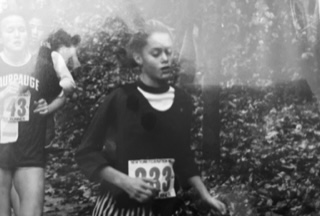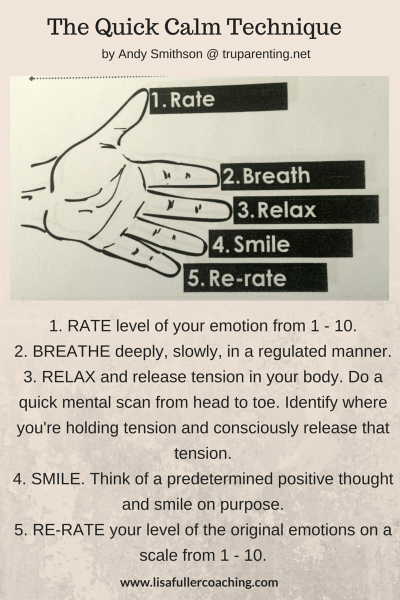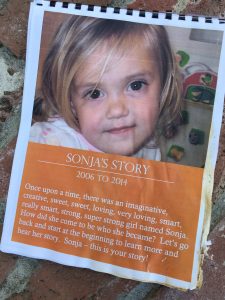by Lisa Fuller | Sep 7, 2023 | Communication, Conflict, Connection & Love, Encouragement, General, Parenting, Self-care, Setting Limits, teenager
 I was competing in my first cross country race, a freshman in high school, when I hit the notorious ‘wall’ going up aptly named Cemetery Hill in Van Cortlandt Park in the Bronx. My legs felt like lead stumps, my breath was short and effortful, and utterly defeated I decided to walk. Then I heard a voice, it was my Coach Mitch, yelling in his Queens accent, Come on Fuller, you can do this!!! I didn’t even know he was there, yet somehow he appeared, clipboard shoved in his armpit so he could clap his hands and wave me up the hill. As I trudged past him, I used the little energy I had to swear at him.
I was competing in my first cross country race, a freshman in high school, when I hit the notorious ‘wall’ going up aptly named Cemetery Hill in Van Cortlandt Park in the Bronx. My legs felt like lead stumps, my breath was short and effortful, and utterly defeated I decided to walk. Then I heard a voice, it was my Coach Mitch, yelling in his Queens accent, Come on Fuller, you can do this!!! I didn’t even know he was there, yet somehow he appeared, clipboard shoved in his armpit so he could clap his hands and wave me up the hill. As I trudged past him, I used the little energy I had to swear at him.
I had to keep going
At the time I didn’t understand it but looking back now it’s clear I was furious at Mitch because I wanted to give up and he wouldn’t let me. His words meant someone had faith in me and was expecting me to finish, so I had to keep going.
We are both the runner in this story AND the coach
As parents, we know that standing by our children during their darkest hours requires a special kind of endurance. We are both the runner in this story AND the coach. We have to endure the pain and take the brunt of our children’s stress, anxiety and even anger at the challenges they face.
Do you remember that feeling of intense love and simultaneous dread when you first became a parent? For me it sounded like this, “from here on out, I will, without question, jump in front of a bus for this human.” My children would forever be my priority.
But it wasn’t until son #2 was in high school and became addicted to vaping, then drugs, that I realized the depth of inner strength I’d need to endure this level of challenge for my child.
Parenting calls upon the limits of human endurance
If you’ve ever loved a child suffering with addiction (or mental health issues, learning differences, social challenges or any of the other tough situations that young people face), you know how hard and painful it is to let go while also being present and not giving up. Parenting calls upon the limits of human endurance.*
FIX IT!
As a mother, my first instinct was to fix the problem. I fed him nutritious and delicious meals. I monitored who he hung out with, where he went. I tried, through lengthy discussion, to talk him out of it. And we even went to hot yoga together twice a week at 5:30am (confusing I know but it was part of his effort to convince me that he didn’t have a problem). But nothing fixed it or got him to stop using drugs. Nothing fixed the tension in our home, the silence, the anger and sadness.
Let go….
Finally, with resignation and relief, I let go and focused on what I could control: myself. I knew the only thing I could do was to continue showing up for him. Continuing to show up for someone you’re sometimes afraid of and other times furious at isn’t simple. Equally, if not more difficult was to continuously muster the courage I’d need to have faith that he would get through it, that he would make it up that hill alive.
Most of the time I felt like a failure and also a person who was doing her best.
During these three years my father died, my grandmother died, my dog died and I was diagnosed with skin cancer.
As a parent we endure what our children go through while juggling the complexities of our own life.
During these three years, I was in disbelief, not that this was happening in our family, but just at how extraordinarily painful life can be.
I questioned if I could keep going through my grief and fear, but I knew that giving up was not an option. It felt like that bus I’d imagined 20 years ago was heading directly for me.
With some combination of good fortune and persistence, my son and I survived, which is a story for another time. Everyday I’m grateful and everyday I know how lucky we are because there are so many families who continue to suffer or don’t make it.
Today he’s working as a counselor with young people facing addiction while attending college. He tells me that what made the difference for him was knowing he had a family that loved him and didn’t give up on him, even when he gave up on himself.
You can read my specific strategies for supporting a child in the throes of addiction below.
If you’re facing a hard situation as a parent I’m here to remind you:
- You’re not alone and that the isolation that parents feel during such a struggle adds immeasurably to the pain… so even though it can feel impossible, I encourage you to reach out for support.
- While you feel like you’re forging your way up your own Cemetery Hill, you have the power to tap into the special kind of endurance despite the sadness, anger or fear you may be experiencing, you can do this. You can hang in there when it hurts and when you mess up and say the wrong thing. Your child will know you tried your best even in the worst of times.
You can do this!!!
Endurance of mind, heart and body for loving an addicted child:
- Establish firm boundaries around safety: I did not leave his younger sister alone with him, nor did I let him drive the car.
- Don’t be afraid to enlist help: I met repeatedly with the vice principal to discuss strategies to make drug use at school more difficult, and reached out to teachers and coaches for support.
- Allow for natural consequences: I did not call the school to excuse his tardiness, absenses, missed work, or neglect for sports practice or competitions.
- Take care of yourself: I made imperfect efforts towards attending weekly (sometimes daily) Al-Anon meetings, reaching out to friends for support, writing it down, exercising, eating healthy food and trying to get enough sleep (this was particularly challenging).
- Cultivate self-compassion: this level two in self-care is a key to how well we treat ourselves and others. Kristen Neff has exercises to help cultivate true self-compassion and one of those is writing.
- Strive for consistency: I maintained predictable meal times, regular communication, and continued to literally tuck him in at bedtime each evening, despite the pain of facing his condition.
- Be present for the recovery journey: I researched school and treatment options, accompanied him to programs, picked him up when he failed, found other options, and kept walking the road with him towards recovery.
- Share your struggle with others: I didn’t keep his drug problem a secret or let it become a cause for shame for him or myself. I reminded myself that drug addiction is an all too common issue for families and I could lean on others for support.
To learn more about how I might be able to support you, schedule a time to meet.
Join my 7-week Parenting Series (via Zoom) beginning September 28th!
This post was inspired by a quote by George Yeoman Pocock that I first read years ago as it was the epigraph to The Boys in the Boat by Daniel James Brown. I was teaching parenting classes at that time and the words jumped off the page. His insights into the special kind of endurance needed for rowing described perfectly the predicament we parents find ourselves in.
Rowing is perhaps the toughest of sports. Once the race starts, there are no time-outs, no substitutions. It calls upon the limits of human endurance. The coach must therefore impart the secrets of the special kind of endurance that comes from mind, heart, and body.

by Lisa Fuller | Apr 14, 2021 | Communication, Connection & Love, Feelings & Emotions, General, Power struggle, Self-care, Self-regulation, teenager
As I write today I’m reminded of a post I wrote 8 years ago, What I Did When My Daughter Said, “You’re the Boringest and I Hate You! This time, however, it’s not what she said, but instead what she didn’t say and didn’t do that shined a light on some difficult parenting wisdom.
Part I – The Sweater
It all began when I knit my 14 year old daughter a sweater. She’d accompanied me to the store to choose a soft, washable yarn in a neutral color she’d actually wear. During Covid I’ve picked up knitting again and found a healthy distraction in searching for patterns and scrumptious yarns. Because my grandmother taught me to knit when I was young, knitting sent a gentle signal to my brain, “Everything’s okay.”
A couple of weeks ago when I completed the sweater, I laid it on her bed so she’d see it when she got home. I imagined she’d try it on and show me how it fit. Over the past month I’d measured the length of her arms, inquired about how cropped she’d like it as that’s the current fashion and worked to tailor it just for her.
Because she never mentioned the sweater, I checked in with her in the afternoon, “Did you see the sweater? Please try it on — I’d love to see how it fits.”
She answered, “Not right now.”
Later I asked her again and she explained that she’d already changed into her pj’s but that she’d do it the next time she got dressed. The next day I decided to mention it one last time. My heart felt heavy. I didn’t want to get entangled in a power struggle with her over the sweater I’d made for her because I adore her. Needless to say, I never saw it on her.
Part II – The Pile
My daughter had recently cleaned out her room, placing all outgrown and unwanted items into a huge bag in the hall. Beside the bag was a loose pile of papers with a blue glue gun resting on top.
After a few days of watching the pile collect dust, I took a closer look and saw under the glue gun a photo storybook I’d created and given to her for her birthday some years ago.
This project, with a closeup of her soft two year old face on the cover looked to have seen better days. I picked it up and brought it into her room asking, “What’s happened to this?” She confirmed that she’d found it spoiled, likely because last fall she’d placed a little pumpkin from our garden on top of it, in a drawer. The pumpkin decomposed over the course of months.
I felt an anger rise in me and said, ‘You clearly don’t care about it.”
She answered, “I do care.”
I said, “If you cared you’d have come to me when you found it and asked what we could do.” I swore, “Just f***ing get rid of it then, but don’t leave it on the floor for me to take care of.”
Heart pounding, I retreated to my bedroom across the hall where I stood motionless, a little shocked that I’d spoken to her so harshly. Being the youngest child she was adept at avoiding conflict and I’d become more able to keep my cool.
For a split second I thought, I’m going to ignore her, give her the cold shoulder. A memory flashed from the recesses of my mind of my dad ignoring me for two weeks after his feelings had been hurt because I’d been spending weekends at my friend Sharon’s house. I can remember him scolding me as we stood inside our front door, “You care more about her family than you do your own!” I was in 5th grade at the time and it was two weeks before he looked at or spoke to me again.
I decided I wasn’t going to ignore her, even though to hurt her back felt like the “natural” response.
Returning to her room, disintegrating storybook in hand I said, “I realize the reason I’m so upset is that my feelings are hurt. It’s becoming clear to me that you don’t care about things I’ve made for you.”
I was of course thinking about the unadorned sweater.
I repeated myself, “It’s becoming clear to me, and I’m speaking to myself now, that I need to focus less on you and more on myself.”
I felt my voice catch and tears well in my eyes.
Unlike 8 years ago, this time she said nothing. Through the uncared for storybook and forgotten sweater I was getting a message loud and clear, “Mom, get a life. While I need you to be there for me, I don’t need you the same way I used to and I’m not going to act in ways to please you. You haven’t trained me to take care of you and I’m not going to start now. My main concern right now is my friends and all the changes I’m going through. You can’t use me to feel good about yourself.”
I felt grounded when I turned to leave her room, closing the door quietly behind me.
I haven’t figured it all out yet.
It felt valuable to write about and share with you because it’s not spit spat all settled in me and tied up with a bow and maybe you’re having your own messy parenting moments. I’m sitting with a real life collision between my daughter’s age appropriate growth and what I’m gently naming my age appropriate stuckness, a slice of difficult wisdom.
It’s not only children who grow. Parents do too. As much as we watch to see what our children do with their lives, they are watching us to see what we do with ours. I can’t tell my children to reach for the sun. All I can do is reach for it, myself.
— Joyce Maynard

by Lisa Fuller | May 17, 2017 | Connection & Love, General, Parenting, Self-care
Dear Devoted You,
Mother’s Day is a sweet time to recognize all the good.
I feel so lucky because I’ll be able to celebrate this year with my own dear mother. She’s a quirky, creative, generous woman and an absolute treasure to me.
At the same time, life is not all happiness and joy right now for me as a mother.
One of my children is suffering. And as you know, when your child isn’t well, it can feel impossible to let that pain go.
So if your heart also aches because of an issue with your child, I want to remind you (and myself): we’re not alone.
My Mother’s Day message this year is simple: Take care of yourself.
Make a mindful choice to do the following:
- Exercise
- Eat well
- Sleep!
- Expand your tunnel vision*
*Devote time and energy to other relationships in your life. When you’re in a crisis with one child you can understandably suffer from tunnel vision. Consciously decide to continue to focus on your other children, spouse, and friends (the supportive ones). This expansion will breath life into you by widening your perspective AND for maintaining those important connections with people who love you and in the case of your other children, need your continued connection.
It’s easy to forget these basics and fall into destructive patterns when we’re filled with worry.
When you make self-care a central part of your life, you’ll find that the kindness you show yourself infuses your own life, and the life of your family with positivity. It provides a model for your child and makes the path to reach your goals and those of your family so much smoother. (source:
8 Self-Care Tips for Parents Who Have No Time for Self Care.)
You’re important to me and I’ve missed the opportunity to connect.
We’re all in this together and I appreciate the community you provide for me along the journey of motherhood (and boy it’s tough at times!)
I hope you’re well and wish you a Happy Mother’s Day.
Love,

by Lisa Fuller | Sep 7, 2015 | General, Motivation, Parenting, Self-care
Being on autopilot has gotten a bad rap. Mindless, unconscious, not thinking, a cognitive state in which you act without self-awareness.
Here’s why, as a parent, I love it. (Maybe you’ll relate, too?)
Autopilot can help you live with a focus on what really matters to you — without all the effort.
When you get into parent mode and forget to do the things you love (and even the things you don’t but simply need to do — like go to the doctor!), autopilot comes in handy. If you’re one of those who goes weeks or even months before you remember to do something for yourself, or who’s just plain forgotten what it is you love (besides your kids) you need more autopilot.
Autopilot – a navigational device that automatically keeps ships or planes or spacecraft on a steady course.
Think of yourself as a whole person (the entire spacecraft if you will!) – parent, spouse, leader, singer, creator, lover, grower, cooker, collaborator, teacher, hugger….
As a whole person, you have many different courses that need to be followed on a daily basis — not the least of which are courses that help you take care of you.
Here’s how I’ve consciously used autopilot to experience more joy in my life… on a consistent basis.
When my first son was born, none of my friends had children. I was the first. In some ways it was wonderful because initially, friends offered to sit for him while my husband and I grabbed a bite to eat or took a walk. Our baby boy was a novelty who delighted and surprised.
However, after a few months, I noticed I wasn’t seeing friends. I was exhausted and it took too much energy to organize socializing. While I felt fried by the physical demands of parenting, I deeply missed my connection with my friends.
I decided to form what came to be known as “dinner group.” With 3 other couples that I knew from social work school, we’d gather every Thursday evening at one of our homes for a meal. We had a rule that host duties rotated and to keep it simple the host did all the work — no stepping in to help clean up, and it was okay if you to arrive late.
Dinner group endured for 15 years. Autopilot worked like magic. We attended each other’s weddings and births and even put together a cookbook of our favorite recipes. That deep, continuous connection that I craved was achieved without the daily nagging feeling, “I should invite friends over.”
***
I also love live theatre, but feel completely overwhelmed by the Pink Section (the San Francisco Chronicle’s arts section). I find it stressful to make future plans and, frankly, to commit. I weigh the cost of a show and wonder if it’s really worth it. And then I end up not doing anything.
However, a fews years back my husband surprised me with season tickets to the Berkeley Rep for my birthday. The gift of theater and not having to decide and follow through has been huge. I’ve renewed the tickets every year since… why? Autopilot.
Just yesterday I put dates for six shows in my calendar from September through June. I look forward to and plan around these dates. I invite a friend or my husband and we make an evening of it with dinner and lots of time to chat and connect.
It’s an absolute luxury. A treat. What makes it doubly delicious is that I don’t have to go to the effort of researching, weighing, purchasing and planning. Sure, some shows are better than others but the surprise and ease is a large part of the fun.
***
 What do you love that you’re not doing because you’ve got kids and it feels like too much effort to set plans in motion? What doesn’t feel worth the hassle right now, but you know at the end of the year (or the end of your life!) you’ll feel a deep pang because you didn’t ________?
What do you love that you’re not doing because you’ve got kids and it feels like too much effort to set plans in motion? What doesn’t feel worth the hassle right now, but you know at the end of the year (or the end of your life!) you’ll feel a deep pang because you didn’t ________?
Your list might include going to the theatre, having dinner with friends on a regular basis, Monday dog walks with your BFF or keeping up with your Positive Discipline practice.
If it’s the latter, and you’ve already taken at least 12 hours of PD instruction, get yourself on autopilot by signing up for the on-going Roots series.
It’s once a month (September – May) — don’t torture yourself by having to consider it every month. Just sign up and be done with it. If you make it, great, if not, chalk it up to making an intention that you really care about.
Once you’ve got the Roots meeting on your calendar in ink you’ll be more likely to attend — the first step in making a change is bringing your mental focus to what you want to change.
***
I just learned that Frances McDormand is playing Lady Macbeth in a production in the upcoming season at the Berkeley Rep. Don’t ask me where my seats are, what they cost, or even what month I’m going. It’s on the calendar and I’m thrilled!
When I’m engaged in my life, doing things I love (outside of parenting), I’m lighter, happier and more consistently grounded and present with the kids and everything else in my life.
Ask yourself: What do I want more of? What am I craving that I just don’t make time for anymore? What will help me stay steady and on course with more joy?
Next, consider how you can put this activity on autopilot; and finally, set the wheels in motion by calling your BFF to see about that Monday morning walk (scheduled on auto repeat in your calendar).
Lastly, send me an email or share in the comments about your autopilot activity. I’d love more ideas for pressing autopilot.

by Lisa Fuller | Aug 15, 2015 | Connection & Love, Encouragement, General, Parenting, Self-care
This summer’s been a doozy. What once felt like a series of mini health crises has come to feel like the norm with appendicitis, stress fractures, depression, drug addiction, cancer and even death becoming a more common part of life.
Last summer, I started writing a post about how to parent when you feel distracted or distraught by a loved one’s suffering.
It’s a hard topic. So hard, that I never completed the post. I couldn’t bring myself to put a bow on it and send it to you. My thoughts never felt right or complete or enough.
Now, it’s back around as I’m dealing with my own health struggles. This week I had two areas of infiltrating basal cell carcinoma surgically removed from my face. With the surgery behind me and plenty of ice packs, I feel a sense of deep gratitude. My doctor described the tumors as nasty and aggressive and I’m lucky that they could be removed.
So I ask for myself and maybe you too – how do you parent when you’re struggling with your own or a dear one’s illness?
This is what I’ve gleaned talking with some of you and pondering the question these last 12 months:
-
- Keep it simple. When your child’s needs feel draining of the little resources you have serve macaroni and cheese or Cheerios and let them watch TV. It’s okay.
-
- Prioritize. Allow what’s most important to rise to the top. Family, food, sleep, and exercise (if possible) make up my essential list.
-
- Say no mostly and yes only if that YES will enhance your life. Time and energy are limited. Use yours wisely.
- Reach out intentionally. Ask for help — as my friend Liz says, “you may need to get over yourself” to do this. Remember that close friends want to lend a hand, particularly when a bigger situation leaves them feeling helpless.
I “got over myself” this past week when my friend Carolyn came bearing flowers the day before my surgery. Having had a similar experience, Carolyn warned me that the hardest part for her had been after the procedure, when she had to remove and replace the bandages. I immediately asked if she would be willing to come over and help me do that. She said yes, and little did I know just how important it was to have her for moral and physical support. With 22 stitches across my hairline — and as the doctor put it, “too many to count” in my nose — I was weak and close to fainting. It took us an hour and a half to remove and replace all of the dressings that first time. I can’t imagine what it would have felt like to do this alone.
-
- Stick with the facts. Depending on the age of your child, share relevant factual information, but only the surface story. They don’t need to know the details and certainly not your “what if” fears. While your fears may be in the realm of possibility, they’re not the facts.
-
- Be childlike. As much as you can, allow your child’s aliveness and awe of life to touch you and lift you into the present.
-
- Dare greatly by saying no to guilt. Instead, accept that you may be more foggy and distracted than you’d like to be with your kids. It’s okay. Don’t add parent guilt to the list of your full bucket of worries. In Daring Greatly Brené Brown writes, “To set down those lists of what we’re supposed to be is brave. To love ourselves and support each other in the process of becoming real is perhaps the greatest single act of daring greatly” (Page 110).
- Lower your expectations. Finally, be realistic about how much your kids, depending on age, will be able to empathize with you or the situation. In my experience that’s NOT MUCH. They don’t get it, nor should they.
 A few years ago, my brother’s best friend and brother in-law, Steve, died unexpectedly during a surgery. Because Steve was beloved by his community as a volunteer firefighter during the Eastern Long Island pine barren wildfires, acting as Chief of the fire department at the time of his death, founder of the junior volunteer firefighter training program and a village civil servant, the community put on a huge uniformed procession for the funeral. Being family and a close friend, my brother delivered the eulogy. In the midst of the long funeral procession through town, his 8 year-old son Aidan turned to him and asked in a tired voice, “when is this going to be over?” My brother was both heart-broken and relieved by the question. How could Aidan, who’d loved Uncle Steve deeply, be ready to move on? Be so oblivious to the gravity of the situation? Be so cold as to be DONE with Steve? At the same time – in Aidan’s question my brother heard hope and the possibility that life could go on – that tomorrow would eventually arrive and maybe it was sooner than my brother thought possible. In his son’s words were the innocence and gravity of the truth that we do go on, even when we lose the unloseable friend, even when we suffer unimaginable pain.
A few years ago, my brother’s best friend and brother in-law, Steve, died unexpectedly during a surgery. Because Steve was beloved by his community as a volunteer firefighter during the Eastern Long Island pine barren wildfires, acting as Chief of the fire department at the time of his death, founder of the junior volunteer firefighter training program and a village civil servant, the community put on a huge uniformed procession for the funeral. Being family and a close friend, my brother delivered the eulogy. In the midst of the long funeral procession through town, his 8 year-old son Aidan turned to him and asked in a tired voice, “when is this going to be over?” My brother was both heart-broken and relieved by the question. How could Aidan, who’d loved Uncle Steve deeply, be ready to move on? Be so oblivious to the gravity of the situation? Be so cold as to be DONE with Steve? At the same time – in Aidan’s question my brother heard hope and the possibility that life could go on – that tomorrow would eventually arrive and maybe it was sooner than my brother thought possible. In his son’s words were the innocence and gravity of the truth that we do go on, even when we lose the unloseable friend, even when we suffer unimaginable pain.
I’ve decided that it’s okay that I don’t have a bow on this one. Its a question that doesn’t have a neat answer.
Please chime in with your thoughts and questions in the comment section. How do you parent when you feel overwhelmed by your own or a loved ones health challenges or a death?
What advice would you add?

by Lisa Fuller | Feb 16, 2015 | Connection & Love, Encouragement, Feelings & Emotions, Mutual Respect, Parenting, Self-care, teenager
We want our kids to be happy and feel good about themselves — knowing they’re struggling can feel unbearable.
Today’s post is about how to deal with your emotions around your child’s disappointment — a question that Michelle so eloquently asked last time. Here’s my own poignant parenting story….
Years ago when my son, I’ll call him Sunny, was 11 or 12, baseball season had ended and he wanted, with all his heart, to make the all-star team so that he could continue to play. He’d been chosen in years past but knew it was competitive. Being Sunny, he was optimistic and it was clear that playing more baseball was the most important thing in the world to him — hands down. A perfect recipe for parental anxiety.
Each day he’d come home and ask, mom, did the coach call? A look of hopeful anticipation in his eyes.
My heart broke as I had to tell him, 3 or 4 days in a row that no one had called. Silence. Are you sure? Ouch.
Sunny was the kid who went through life, like a duck, letting harsh things that happened to him roll right off. So when he uncharacteristically invested himself in this outcome, it was all the more painful to witness.
At the time I knew that a rescue attempt was ill advised. I felt helpless and didn’t know what to do. While it sounds like a minor letdown now, this disappointment was HUGE in his life, and I was at a loss for how to support him.
Looking back I think his dad or I could have shared our own painful experience if only to join him in that dark space.
I doubt it would have made him feel better but company always helps.
As the parent, I needed to also take a stance that would help me better cope with the urge to jump in and make things better.
As a coach, I often help clients find alternate points of view on an area of their life where they feel stuck.
Below is an example of different perspectives you can step into to shift YOUR experience when your child goes through their inevitable disappointments.
GRITTY VIEW: The research is clear that children who’re able to persevere through trials and tribulations have an essential characteristic for success – grit.
While they’ll remember epic disappointments, if they’re able to weather them with a sense of grounded security, your kids will more likely learn to forge ahead, a quality that will undoubtedly serve them well in life.
Parental fixing (or on the flip-side, shaming) blocks your child from learning this valuable lesson. Fixing and shaming, while they look different, convey the same message to your kid — I don’t believe in you.
[tweetthis hidden_hashtags=”#parenting”]Don’t treat your son like a prince unless his father’s the King, if you do, life will be a rude awakening.[/tweetthis]
I don’t remember where I heard this but I love its clear wisdom.
POETIC VIEW: “For after all, the best thing one can do when it is raining is let it rain.” ―Henry W. Longfellow
Broadening your perspective through poetry and philosophy can be just the tonic you need to pull you out of the painful, cramped feeling of “not enough” that tends to overwhelm you when your
child feels badly.
 MINDFUL VIEW: Practicing mindfulness strengthens your ability to have boundaries.
MINDFUL VIEW: Practicing mindfulness strengthens your ability to have boundaries.
The Quick Calm Technique created by Andy Smithson of truparenting.net is a tool that when practiced can move you from heated to less heated 🙂
Here it is in a nutshell:

Click above to learn more about the entire Quick Calm Toolkit
Use this technique to bring yourself down from anger, anxiety, sadness… these steps enable you to respond more proactively — more mindfully — to any situation you find yourself caught up in. You have power over how you feel.
PASSIONATE VIEW: When you take time to nurture your own passions, you get less tied up in knots about the minutiae of your child’s life. This helps you avoid the unwitting substitution of your child’s experiences for your own.
Here are some examples of activities (outside of work and parenting) that parents have shared with me that bring meaning and passion to their lives:
- join an adult sports team
- volunteer in an underserved school
- write a blog or novel
- coach a team (outside of your child’s)
- volunteer at a hospital
- train for a triathlon
If you don’t want to do it for yourself, then you’ve got to do it for the sake of your kid. Only when you nourish yourself and cultivate your own interests will your child see a way to do this for herself.
MY VIEW: One of the gifts I’ve found through using Positive Discipline is a path to keep things simple.
If I’m bending over backward to make something happen for my kid, I hear that voice inside warning me something’s off or as Michelle put it — “THAT’s INSANITY — DON’T DO IT!”
Still the impulse and overwhelming sadness remains.
Don’t push it away. Rather, let yourself feel sad and have a chance to heal from your own old wound. When you get triggered by your child’s disappointments — take that step back from your kid and look inside — work on your own or with a therapist to experience your not so buried feelings so that you can move on rather than continuing to stuff it down or overreact to events in your child’s life. Be real and feel your feelings.
When you feel stuck in your own or your child’s disappointment, try one of these perspectives or cultivate a view of your own. Standing in a different place could be just the reset you need to reorient yourself and move forward in the direction you want to go.
If you haven’t already done so, join me on this journey!
Wanna talk? Schedule a time here.
 I was competing in my first cross country race, a freshman in high school, when I hit the notorious ‘wall’ going up aptly named Cemetery Hill in Van Cortlandt Park in the Bronx. My legs felt like lead stumps, my breath was short and effortful, and utterly defeated I decided to walk. Then I heard a voice, it was my Coach Mitch, yelling in his Queens accent, Come on Fuller, you can do this!!! I didn’t even know he was there, yet somehow he appeared, clipboard shoved in his armpit so he could clap his hands and wave me up the hill. As I trudged past him, I used the little energy I had to swear at him.
I was competing in my first cross country race, a freshman in high school, when I hit the notorious ‘wall’ going up aptly named Cemetery Hill in Van Cortlandt Park in the Bronx. My legs felt like lead stumps, my breath was short and effortful, and utterly defeated I decided to walk. Then I heard a voice, it was my Coach Mitch, yelling in his Queens accent, Come on Fuller, you can do this!!! I didn’t even know he was there, yet somehow he appeared, clipboard shoved in his armpit so he could clap his hands and wave me up the hill. As I trudged past him, I used the little energy I had to swear at him. 








 MINDFUL VIEW: Practicing mindfulness strengthens your ability to have boundaries.
MINDFUL VIEW: Practicing mindfulness strengthens your ability to have boundaries.

